The first International Academic Forum on "Paleography and Chinese Civilization" commenced on the morning of October 21st in Tsinghua University's main building. The opening ceremony attracted more than 120 scholars and experts from over 40 universities and research institutes spanning across 13 countries including China, the United States, Russia, the United Kingdom, France, Japan, and Germany, among other countries. The Vice President of Tsinghua University, Peng Gang, hosted the opening ceremony.
The opening ceremony was attended by Qiu Yong, Secretary of the CPC Tsinghua University Committee, Hong Dayong, the Director of the Office of Philosophy and Social Sciences of China, Tian Lixin, the Director of the Language and Information Management Division of the Ministry of Education, Professor Sarah Allan from Dartmouth College, Distinguished Visiting Professor at Tsinghua University, and Professor Zhu Fenghan, Peking University Bo Ya (School of Liberal Arts) Chair Professor, who each delivered speeches.
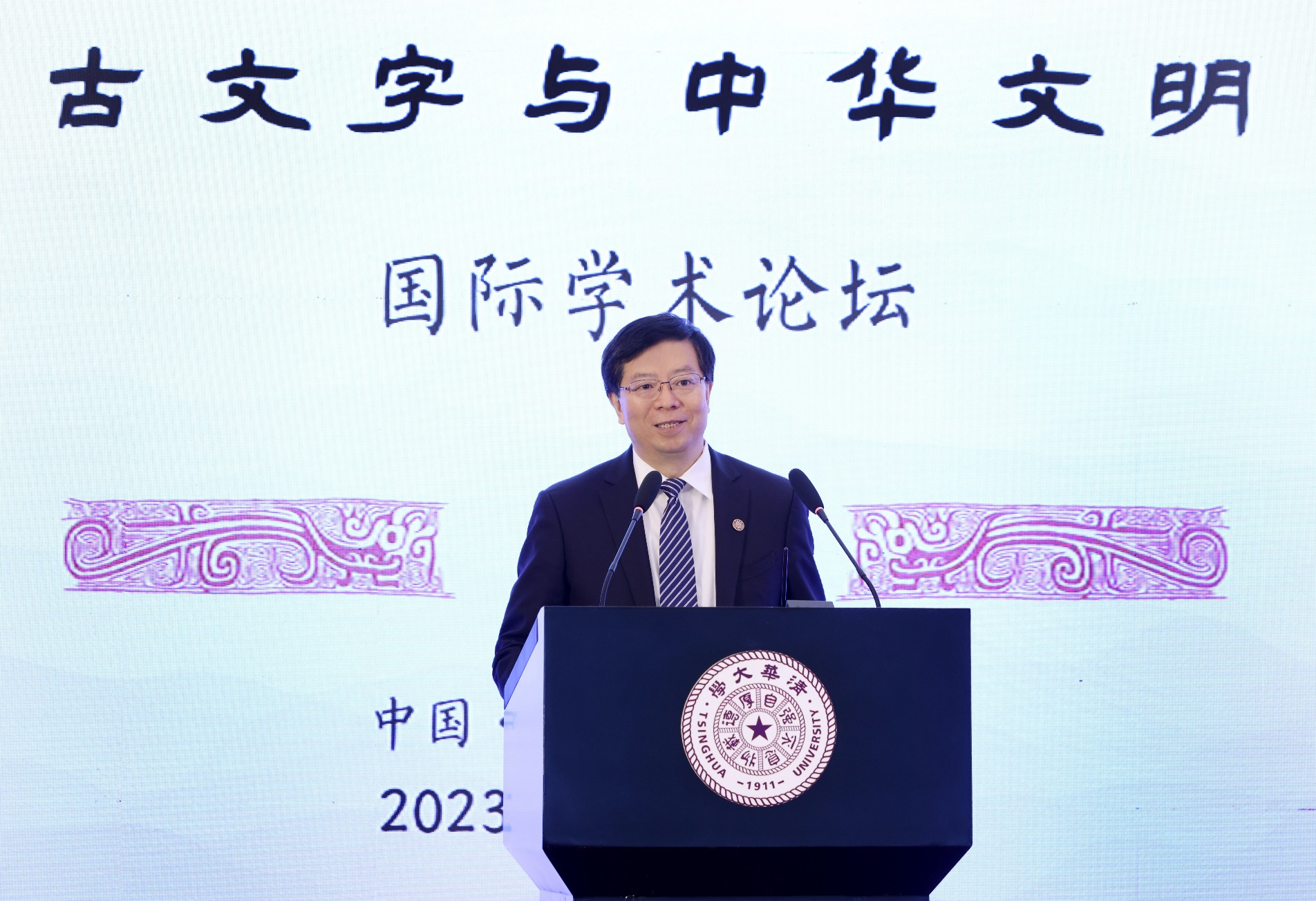
In his speech, Qiu Yong expressed heartfelt gratitude to friends from all walks of life who have long cared for and supported the development of Tsinghua University and the construction of Tsinghua's humanities disciplines. Qiu Yong emphasized that Chinese universities, as important carriers for inheriting and promoting outstanding Chinese culture, should strive to become a vital force in promoting the creative transformation, innovative development, and prosperity and progress of human civilization. In recent years, the University has established the Research and Conservation Center for Unearthed Text, cultivated high-level scholars, and actively promoted interdisciplinary research on ancient texts. To further unlock the historical ideas and cultural values of ancient scripts like oracle bone inscriptions, Tsinghua University launched the International Academic Forum on “Paleography and Chinese Civilization". Through this initiative, they endeavor to create a high-end international academic platform that will foster exchanges and mutual learning between Chinese civilization and various world civilizations. It is believed that the forum will expand international academic exchanges and cooperation in the study of ancient scripts. Tsinghua's research on ancient scripts will uphold the University’s style of integration of Chinese and Western cultures, connecting the ancient and modern, and probing the arts and sciences. It continues the historical context, while writing a new chapter for the era. Moving forward, Tsinghua University will deeply understand the theoretical implications and practical requirements of "clarity in form, effectiveness in use" and working together with colleagues from all sectors of society to establish a cultural foundation for a new form of human civilization. Tsinghua University aims to contribute to the rejuvenation of Chinese civilization and promote harmony among world civilizations on a larger scale.
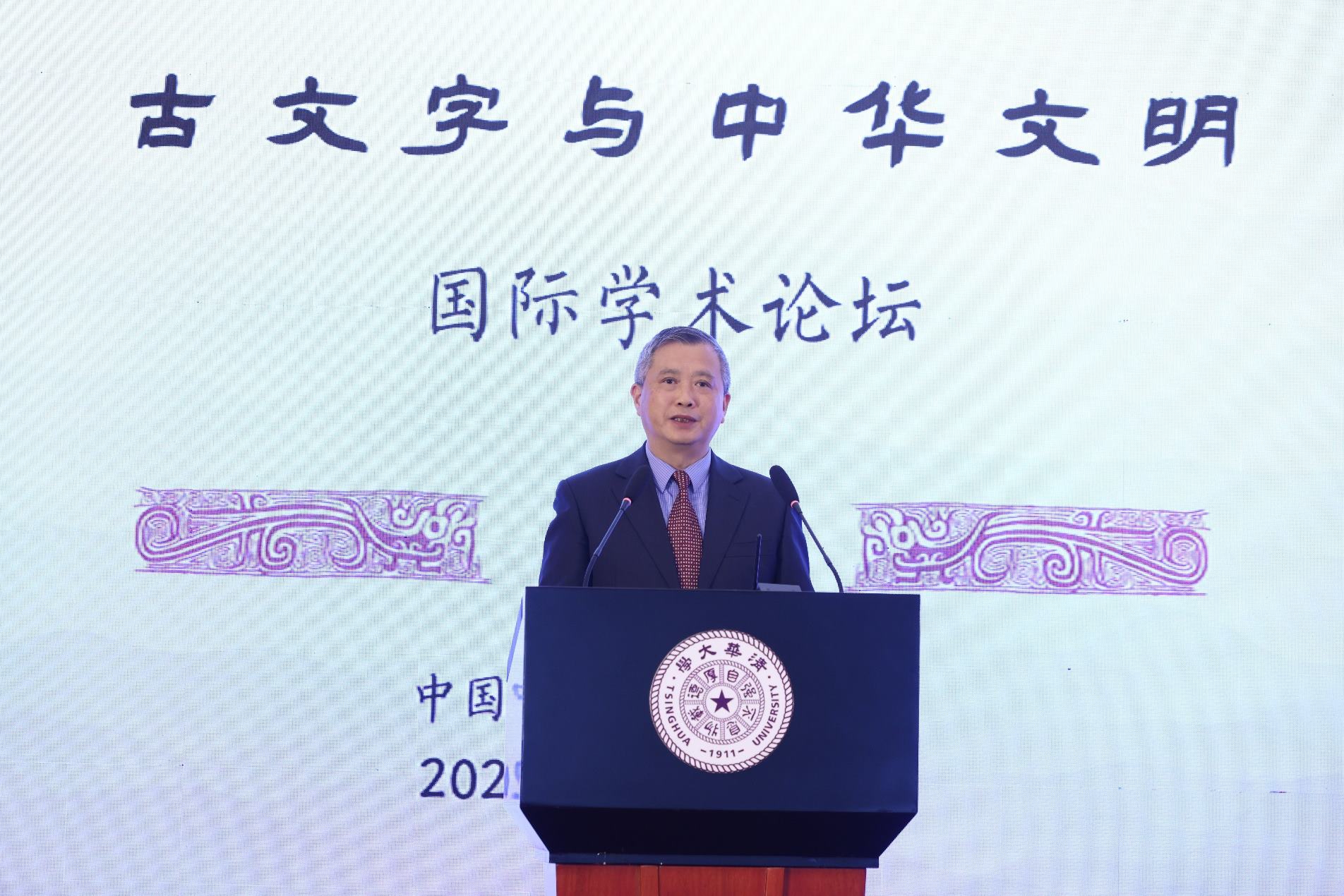
Hong Dayong stated that General Secretary Xi Jinping attaches great importance to the inheritance and development of language and Chinese civilization. He emphasized that Chinese characters are a symbol of Chinese cultural heritage, and this inheritance represents the true essence of Chinese identity. Tsinghua University is organizing this forum, inviting renowned scholars and experts in the field of paleography and traditional culture from both domestic and international backgrounds to gather at Tsinghua campus for in-depth exchanges and discussions on the inheritance and development of ancient scripts and Chinese civilization. This event is a momentous and celebratory occasion for the research community devoted to ancient script.
Hong Dayong introduced the efforts by the National Social Science Fund over the years in supporting the research of paleography. He emphasized the Fund's strong commitment to supporting the study of ancient script and pledged to further enhance support in order to drive new advancements and breakthroughs in the research of Chinese character civilization. In terms of advancing the disciplinary system, academic framework, and discourse within the field of paleography, Hong Dayong presented four aspirations: first, to enhance the overall development level of the discipline of ancient writing and develop new methods and paradigms that are compatible with the digital age; second, to produce original landmark achievements that represent the national standard, thereby contributing substantial academic strength to the cultural rejuvenation and the construction of a modern Chinese civilization; third, to cultivate a talented workforce characterized by both moral integrity and academic excellence, providing a solid talent foundation for ongoing scholarly innovation; fourth, to strengthen international academic cooperation and deepen exchanges and mutual learning between civilizations, contributing essentials, wisdom, and vitality of the Chinese nation to the development of global civilization.
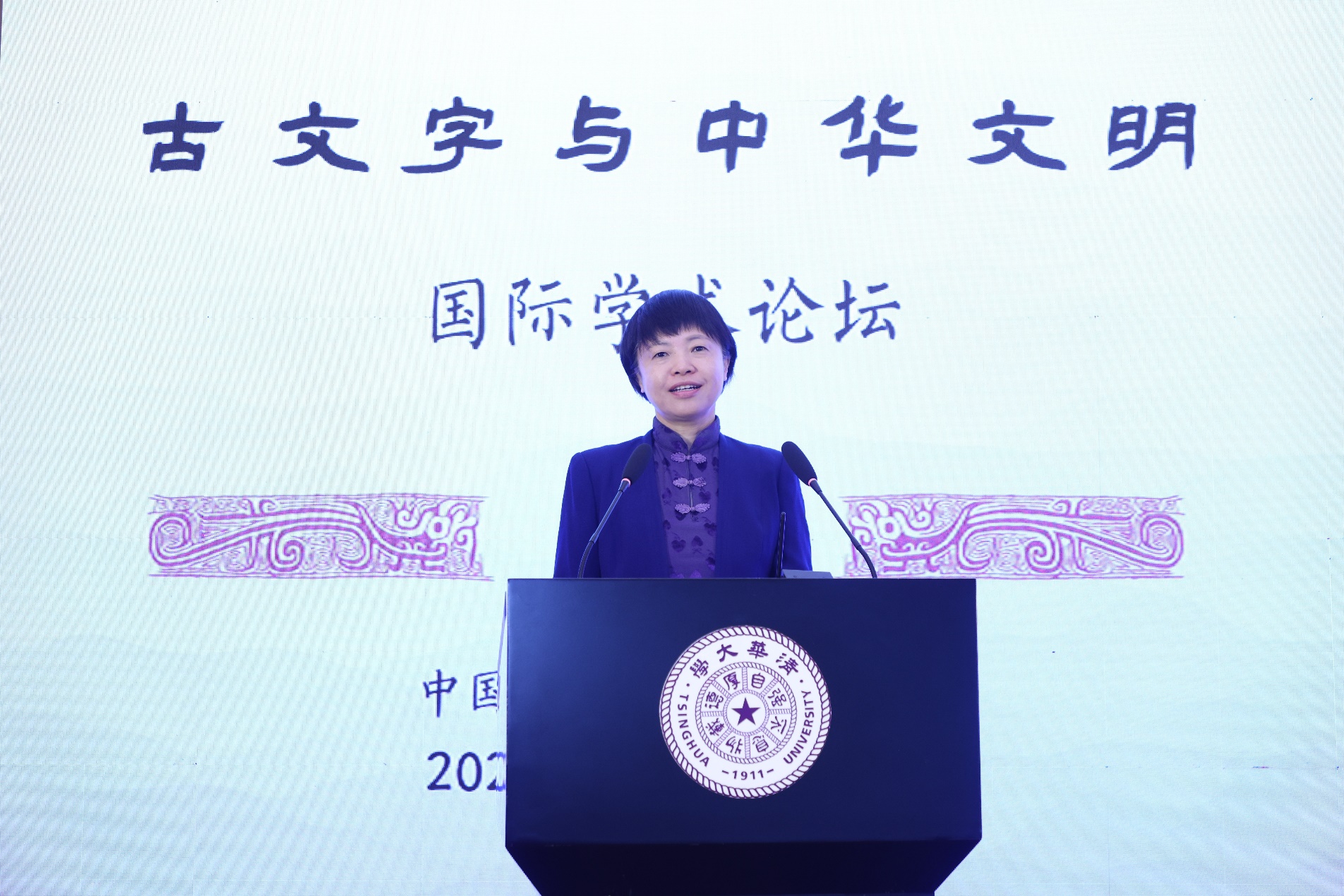
Tian Lixin highlighted the significant and profound implications of hosting this forum in the backdrop of the 10th anniversary of General Secretary Xi Jinping's proposal for jointly constructing the Belt and Road Initiative. She emphasized its crucial importance in driving the advancement of the study of paleography and Chinese civilization. General Secretary Xi Jinping places great emphasis on the preservation and development of China's exceptional traditional culture, notably represented by oracle bone inscriptions. In several pivotal speeches, he has underscored the groundbreaking significance of the major discovery of oracle bone inscriptions in the history of Chinese and global civilization. The Chinese script is truly remarkable, and the formation and evolution of the Chinese nation are inseparable from the nurturing of this writing system. The government has provided strong support for research efforts in this domain, initiating the "Project on Paleography and the Inheritance and Development of Chinese Civilization" in 2020. This project comprehensively and systematically explores various forms of ancient writing, including oracle bone inscriptions, bronze inscriptions, and bamboo and silk scripts, in order to shed light on their profound role in the development of Chinese and human civilization, resulting in notable achievements. It is imperative to further deepen international exchanges and cooperation in related fields, strengthen comparative studies of ancient civilizations, facilitate overseas investigations into ancient manuscripts, and promote the translation of research outcomes. By adopting a global perspective, we can elucidate the contemporary value and global significance of the Chinese cultural spirit. Tian Lixin advocated for experts and scholars from home and abroad to serve as mediators between Chinese and foreign cultures, joining hands and making more proactive efforts to foster cultural communication, enhance mutual understanding, friendship, and cooperation. Through language and cultural ties, we can facilitate exchanges and mutual learning among civilizations.
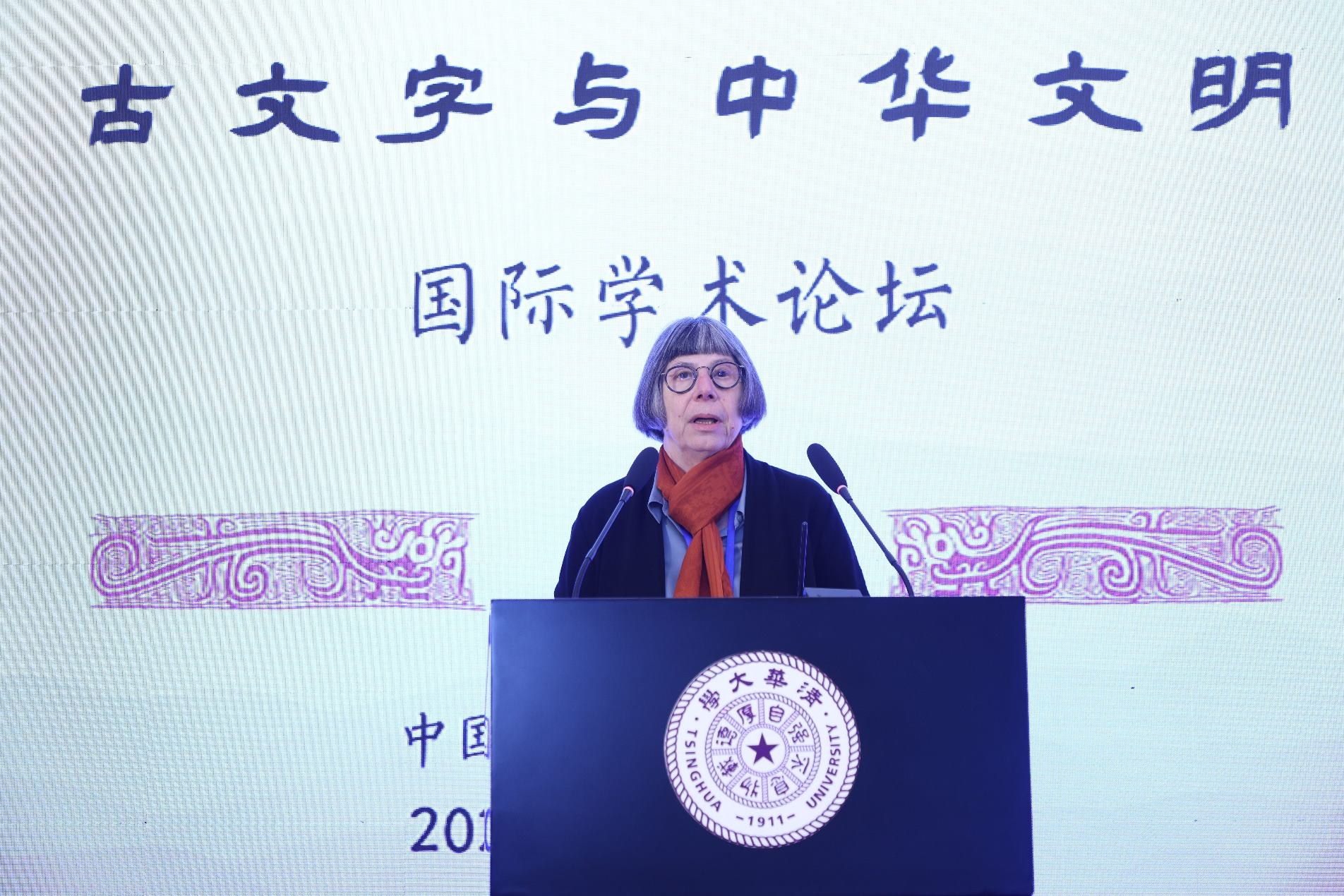
Sarah Allan expressed her appreciation for the significant advancements made by Chinese and international scholars in the field of early China. She attributed these achievements to the generosity and open-mindedness of Chinese scholars. Additionally, she expressed gratitude towards paleography research centers such as Tsinghua University for their efforts in the preservation, conservation, and publication of unearthed bamboo manuscripts. These endeavors, coupled with the academic exchanges facilitated by these centers, have played a pivotal role in shaping the successful career of Western scholars. Drawing from her own experiences as a young student studying early China in the United States, Professor Allan acknowledged the inherent differences in intellectual contexts between Chinese and Western scholars. These differences contribute to divergent perspectives on the same subject matter. In light of this observation, she emphasized the significance of academic cooperation and collaboration. Furthermore, she warmly welcomed future events like this international dialogue, as they provide valuable opportunities for scholarly exchange and discourse in the new era of studies on early China.
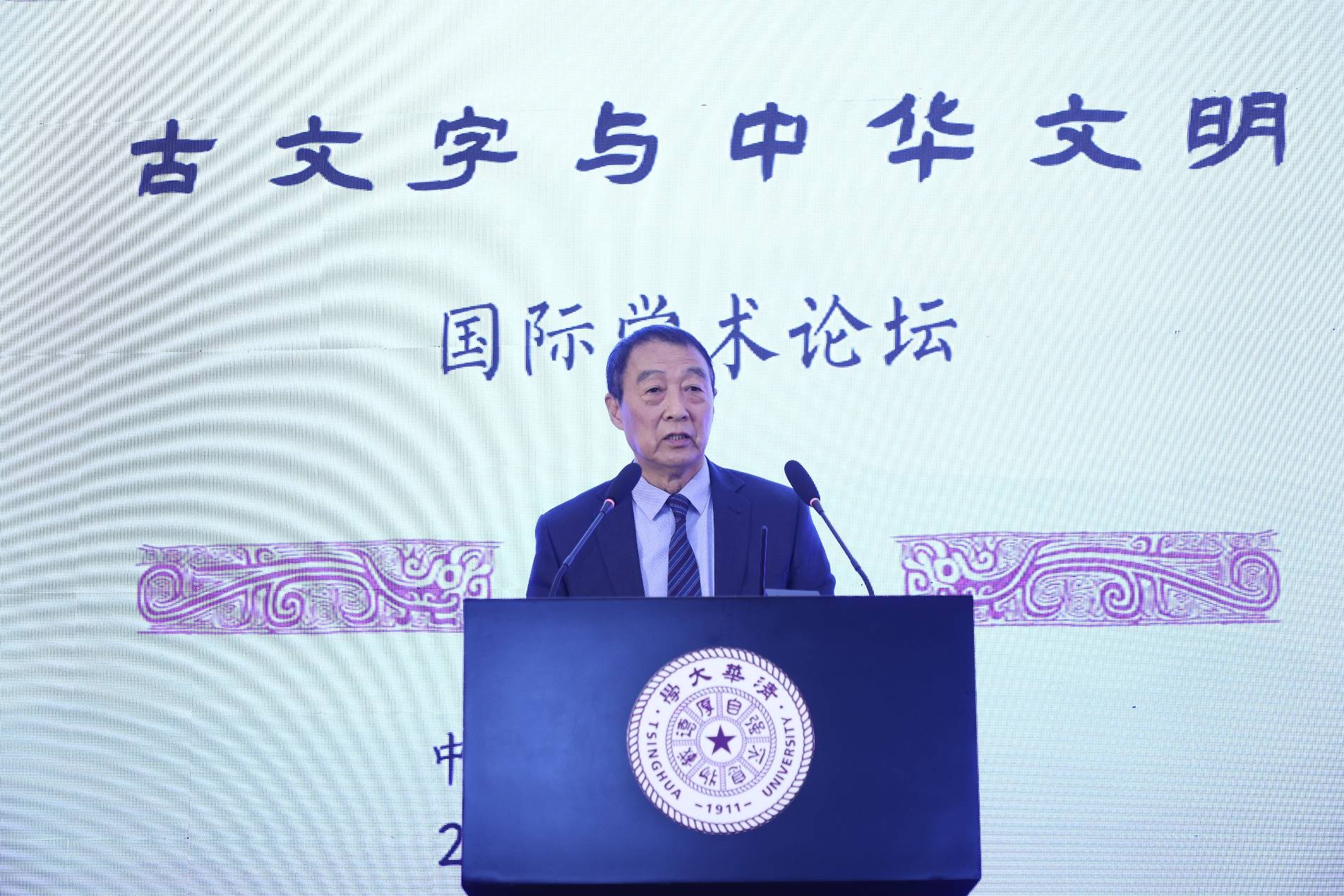
Zhu Fenghan stated that the hosting of such a prestigious and large-scale academic conference by Tsinghua University, with a special emphasis on paleography, fully demonstrates the significant importance of ancient writing in promoting and inheriting excellent traditional Chinese culture and advancing the exchange and mutual learning between Chinese civilization and world civilizations.
In the keynote speech session, Professor Qiu Xigui from Fudan University entrusted the conference organizing committee to present the keynote article. Keynote speeches were then delivered by Professor Edwardhaughnessy from the University of Chicago, Professor Dirk Meyer from the University of Oxford, and Professor Zhang Guangyu, Chair Professor in the Department of Chinese Language and Literature at Hang Seng University of Hong Kong and Honorary Professor at Tsinghua University.
Qiu Xigui delivered an insightful observation regarding the oracle bone inscriptions from the Yinxu Period and the early bronze inscriptions of the Western Zhou Dynasty. These inscriptions revealed the emergence of a concept similar to "mana," a term extensively debated in cultural-anthropological studies and signifying "spirit" in archaic Polynesian societies. Interestingly, in the early Chinese glossary, this term is not represented as 精, which directly translates to "spirit," but rather as 晶.
Following Qiu's keynote, Edward Shaughnessy revisited an old issue that he has long debated with his colleagues at Tsinghua University. As suggested by the title of his talk, this marks his fourth attempt to argue for interpreting 甶 as "wish" instead of "cause." By presenting a plethora of new evidence, he once again emphasized that, in most cases, the 甶 found in unearthed manuscripts should be read as 思, thereby challenging the established convention.
Taking a socio-philological perspective, Dirk Meyer examined the recently published Analects from the collection of the Anhui University Warring States bamboo manuscripts. Meyer's interpretation of this text suggests that it is a cohesive argument-based composition that played a significant role in establishing Confucius as a "philosophical institution." This challenges the traditional notion of the Analects as a collection of fragmented sayings by Confucius and his disciples, as commonly known today. Instead, the manuscript text presents a coherent selection of sayings that demonstrate a consistent linguistic and conceptual logic. This sheds light on the editorial effort undertaken to establish Confucius as a philosophical figure. Meyer argues that it is crucial to view the Anhui University Analects as representative of the Confucius canonization during the Warring States period.
Returning to rigorous and in-depth exegetical analysis, Cheung Kwong Yue offered a profound reflection on the newly discovered characters 谦 and 诚 found in the Tsinghua Bamboo Manuscripts. He argued that their graphical structures, combined with other supporting evidence, lead to the conclusion that a portion of these manuscripts were written down towards the end of the Warring States Period.
The International Academic Forum on "Paleography and Chinese Civilization" is hosted by Tsinghua University and co-organized by the Tsinghua University Research and Conservation Center for Unearthed Text and the Secretariat of the Paleography Program. The forum thoroughly explored the nature of early Chinese writing systems, including oracle bone inscriptions, bronze inscriptions, bamboo and silk manuscripts, and more, and promote and preserve China's rich traditional culture while fostering exchange and mutual learning between Chinese civilization and global civilizations. Over two days, scholars engaged in discussions organized into four panels: "State and Society in Early China," "The Tsinghua Bamboo Manuscripts," "The Shang and Zhou Scripts," and "The Warring States / Qin and Han Scripts." During the two-day forum, over one-hundred scholars, including Martin Kern, Li Ling, Donald Harper, Liu Zhao, and Yuri Pines, conducted extensive exchanges and discussions on the aforementioned topics. The forum exhibits the tangible outcomes and scholarly achievements of the ongoing national cultural initiative known as the "Project on Paleography and the Inheritance and Development of Chinese Civilization" in the reception hall of the main building.
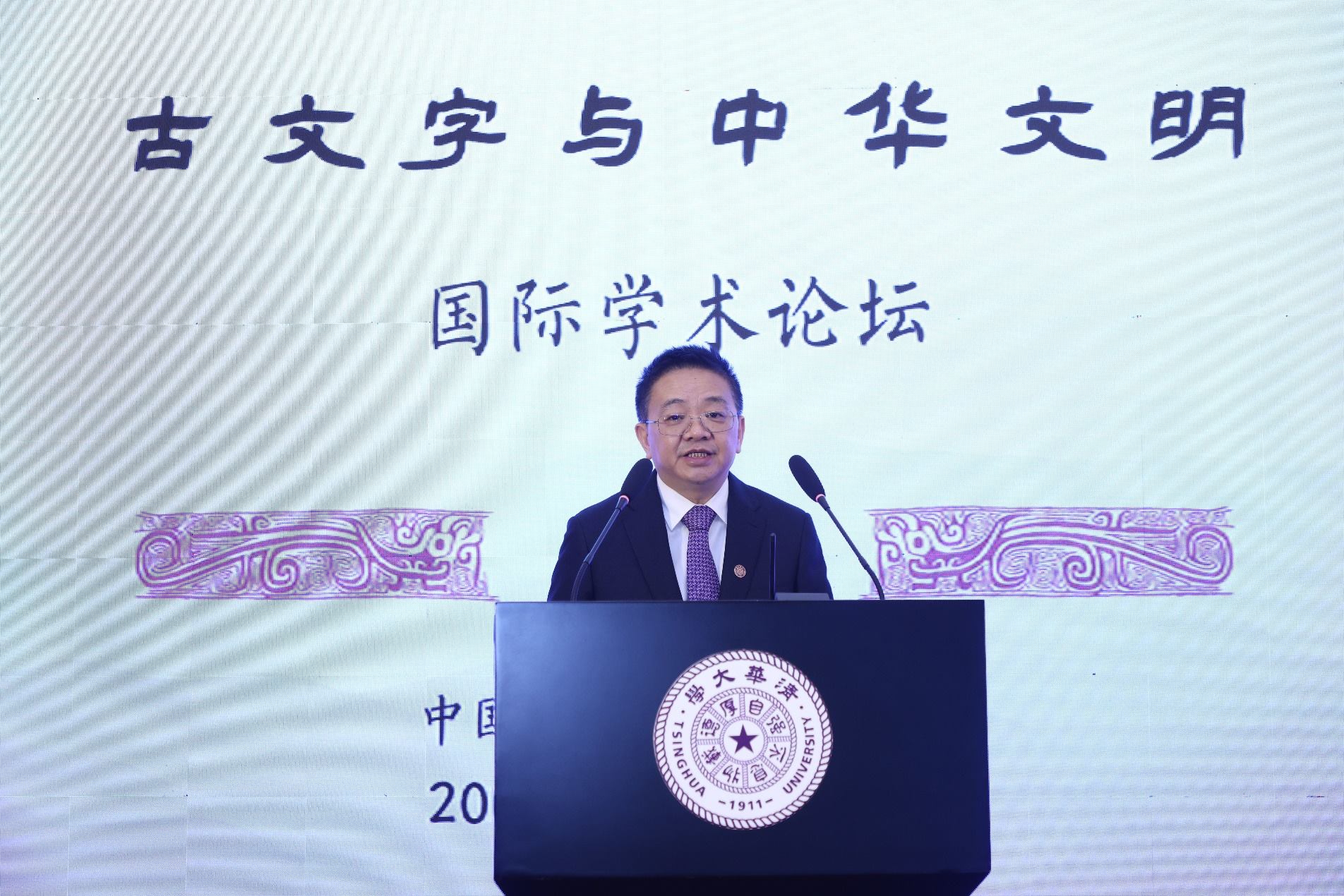
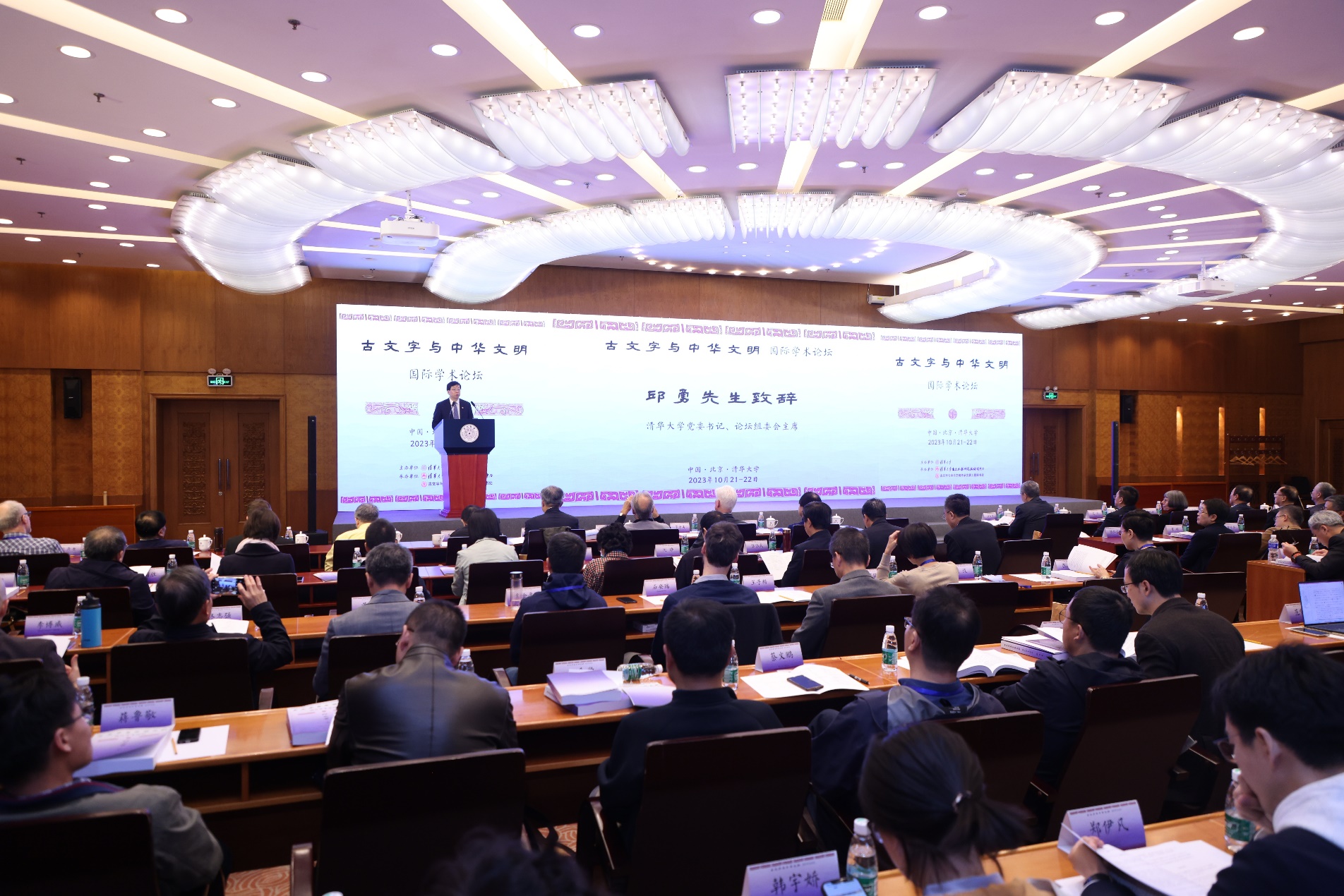
As a prestigious research institution in the field of humanities at the university level, the Tsinghua University Research and Conservation Center for Unearthed Texts has been making significant contributions since its establishment in 2008. It has gained recognition as one of the Key Research Institutes of Humanities and Social Sciences of the Ministry of Education and the leading institute of the National Center of Collaboration and Innovation. The center's primary focus is the preservation, compilation, and scholarly exploration of the Warring States bamboo slips that were salvaged and safeguarded by Tsinghua University. Additionally, the center actively engages in the study of other excavated documents such as oracle bones, bronze inscriptions, and unearthed texts from the Warring States, Qin, and Han periods. It also plays a significant role in the University's implementation of the strong foundation plan and the cultivation of talents in the field of paleography, which encompasses both doctoral and master's degree programs. To date, the center has published twelve volumes of The Tsinghua University Warring States Bambo Manuscripts, a comprehensive series comprising forty-three volumes titled Compendium of Oracle Bone Tracings, as well as The Tsinghua University Warring States Bamboo Manuscripts: Studies and Translation 1: The Yi Zhou Shu and Pseudo-Yi Zhou Shu Chapters.
Editors:John Paul, Li Han

